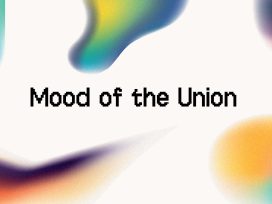Post-revolutionary Ukrainian society displays a unique mix of hope, enthusiasm, social creativity, collective trauma of war, radicalism and disillusionment. With the Maidan becoming history, the focal point ‘Ukraine in European Dialogue’ explores the new challenges facing the young democracy, its place in Europe, and the lessons it might offer for the future of the European project.
This focal point stems from the project ‘Ukraine in European Dialogue’ at the Institute for Human Sciences (IWM) in Vienna. The focal point is edited by Mariia Shynkarenko at the IWM. From 2018 to 2024, it was edited by Katherine Younger, and from 2016 to 2018 by Tatiana Zhurzhenko. Further texts have been contributed by journals in the Eurozine network.

In collaboration with
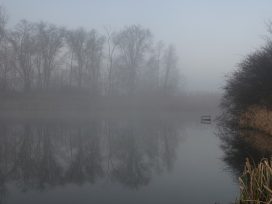
Injustice is the universally understood common denominator that connects soldiers and liberals in Ukraine. With the war effort accelerating to the use of long-range missiles on Russian territory, a personal account of swapping aid provision for firearms explains the decision to fight, proving how contemplation never ceases.
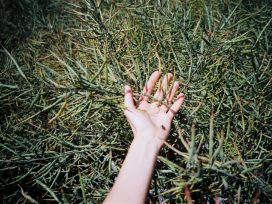
Tracing responsibility for honeybee losses in rural Ukraine points to farmers and pesticide-treated rapeseed fields. But whose practices really lie behind the short-term bid to increase crop productivity? And what do the historic uses of agrochemicals tell us about their current weaponization?
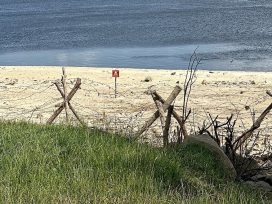
Perceiving war as a series of strategic manoeuvres delineated on a map renders a horizontal view of conflict. And projecting an end to fighting is fundamentally restorative. But deep pollution, as is occurring in Ukraine from Russia’s radioactive colonialism, warns of a more persistent dimension with long-term environmental impact.
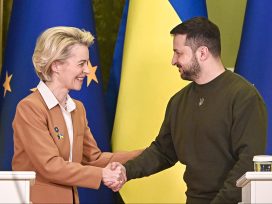
Western Europe’s historical denial of Ukraine’s Europeanness stemmed from the same imperialist root as Russia’s denial of Ukraine’s national existence. Against this background, the EU’s recent change of heart is momentous.
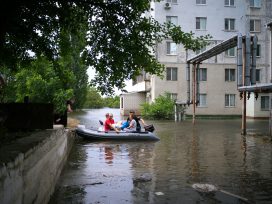
The Ides of March
Ecocide in Ukraine
The immediate need for environmental protection and reparation in war-torn Ukraine has entered the country’s peace plan. Legislative revisions, recognizing ecocide, and thereby advancing the rule of law globally, expand what it means to develop responsible governance of the ecosystems that sustain us.
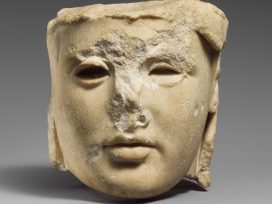
Counteroffensive exhibitions
Interview with Lizaveta German
Artistic expression can surface from desperate situations. Despite oppression and impoverished circumstances, the self-organization of Ukrainian creatives has led to a special kind of resistance. Collectively taking care through adversity, their practices focus on treating emotional wounds, from the Bucha Massacre to the Holocaust.

On the occasion of Europe Day, Oleksandra Matviichuk, Ukrainian human rights defender and director of the Nobel Peace Prize-winning Center for Civil Liberties, delivered this year’s Speech to Europe at Vienna’s Judenplatz.
Time to live
Ukrainian cuisine, literature and cafés
Defending territory in war expands beyond physical frontlines to include cultural ground. Reclaiming signature dishes, language and public space contests their colonial assumption. Upholding traditions and retaining small home comforts takes on greater significance.
‘Multi-ethnic’ or ‘diverse’?
Ukraine’s fading ethnic differences
As Ukrainian citizens of varying ethnic backgrounds continue to unite in resisting the Russian military onslaught, their identity as Ukrainians is perceived increasingly in terms that are civic, national and inclusive rather than pertaining to ethnic origin.
Heating is no longer as simple as flicking a switch: burning fossil fuels is environmentally unsustainable; and, this year, Europe’s reliance on Russian gas, weaponized by the Kremlin, has created a rush for alternatives. In Ukraine, where power facilities are under repeated attack, existing, pre-war energy efficiency plans have become a lifeline.
Vienna’s hosting of Ukrainian artists and writers recalls the days of the fin de siècle, when the city was a magnet for intellectuals seeking freedom from Tsarism. But despite strong historical affinities, subtle barriers to solidarity with the Ukrainian exiles remain.
When Boris Yeltsin told George Bush in 1991 that the USSR couldn’t exist without Ukraine, he wasn’t referring to the economy: culturally, Russia would have been isolated. Today, the same thesis about Slavic identity is being debated with rockets. Serhii Plokhy on Ukraine’s special role in Soviet and post-Soviet history.
The names of us
How Russians are destroying national diversity in Ukraine
Afina, Usein, Maria, Jasim – a Greek Roumean, a Crimean Tatar, a Swede and a Turkish-Meskhetian, all from Ukraine, all living on the edge – when the attack on nationals, labelled minorities, is life-threatening, calling out the names of those who are in danger recognizes their plight and diversity.
Defined by silence
The Ukrainian art that was destroyed – and the art that never happened
Ukrainian artists are struggling to invent a new language to express their experience of the war, one that goes beyond tropes and commonplaces. Some of them frantically document, others reflect in hurried sketches while on the run with their kids. Many artists don’t create at all – they are on the frontlines.
Word from those on the ground in Ukraine is coming through. And the message is – everyone who needs to leave should, but please don’t say goodbye anymore.

